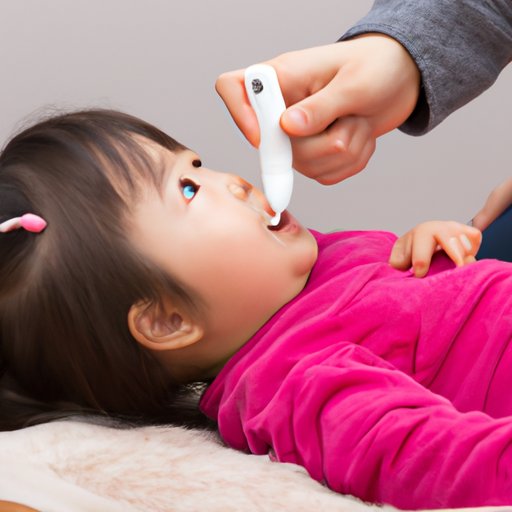Introduction
Respiratory syncytial virus (RSV) is a common virus that can affect people of all ages. However, it can be particularly dangerous for infants and young children, especially those with weakened immune systems. RSV can cause severe respiratory illness, leading to hospitalization and even death in some cases. Fortunately, there are several ways to test for RSV in infants and young children, allowing for early diagnosis and treatment. In this article, we’ll explore the five best ways to test for RSV, why early testing is important, what parents need to know before getting an RSV test for their child, the pros and cons of testing, and more.
The Five Best Ways to Test for RSV in Infants and Young Children
There are five main methods for testing for RSV in infants and young children:
- Molecular tests: These tests use a sample of mucus from the nose or throat and look for the genetic material of RSV. These tests are highly accurate but can take several days for results.
- Rapid antigen tests: These tests also use a sample of mucus and can be done in a matter of minutes. However, they are less accurate than molecular tests and may miss cases of RSV.
- Viral culture: This test involves growing RSV in a laboratory from a sample of mucus. This test is highly accurate but can take several days to get results.
- Immunofluorescence assays: This test uses antibodies to detect RSV in a sample of mucus. This test is quick but may not be as accurate as molecular or viral culture tests.
- Serology: This blood test looks for antibodies to RSV in a child’s blood. This test is not as commonly used as the other methods and may not be as accurate.
Each testing method has its pros and cons, so healthcare providers will choose the best test for each individual case. Molecular and viral culture tests are the most accurate but take longer to get results, while rapid antigen tests are faster but less accurate.
Why Early RSV Testing is Important for Infants and What You Need to Know
Infants and young children are at a higher risk for severe complications from RSV, including hospitalization and respiratory failure. Early diagnosis and treatment are crucial for preventing these complications. Delayed diagnosis can lead to a worsening of symptoms, which can quickly become life-threatening.
A Comprehensive Guide to Understanding RSV Testing: From Symptoms to Diagnosis
Common symptoms of RSV in infants and young children include:
- Coughing
- Sneezing
- Runny or stuffy nose
- Fever
- Difficulty breathing or rapid breathing
- Wheezing
If a child is exhibiting these symptoms, healthcare providers may diagnose RSV based on a physical exam and the child’s medical history. They may also use one of the tests listed above to confirm the diagnosis. Parents should be prepared to answer questions about their child’s symptoms and medical history.
What You Need to Know Before Getting an RSV Test for Your Child
Several factors can affect the accuracy of RSV testing, including:
- Timing of testing: Testing is most accurate when done within the first few days of symptoms.
- Age of the child: Younger children may have higher levels of RSV, making the infection easier to detect.
- Immune status of the child: Children with weakened immune systems may have lower levels of RSV, making the infection harder to detect.
Parents should also be sure to follow any instructions provided by their healthcare provider and ask any questions they may have before the test.
The Pros and Cons of RSV Testing in Infants and Children: Is It Worth It?
There are several potential benefits to RSV testing, including:
- Early diagnosis and treatment, which can prevent complications and hospitalization
- Identification of RSV outbreaks in certain areas or populations
- Proper treatment and management of symptoms
However, there are also potential downsides to RSV testing, including:
- Cost, as some tests may not be covered by insurance
- False positive or negative results, which can lead to unnecessary treatment or delayed diagnosis
Despite these potential downsides, in many cases, RSV testing is worth it to ensure early diagnosis and proper treatment. Healthcare providers can work with parents to determine the best course of action for each individual case.
The Importance of Accurate RSV Testing in Infants and the Risks of Delayed Diagnosis
Accurate RSV testing is crucial for preventing severe complications and ensuring that infants and young children receive the proper treatment. Delayed diagnosis can lead to worsening symptoms, hospitalization, and even death in some cases. Parents should be aware of the symptoms of RSV and seek medical attention if their child exhibits these symptoms.
Conclusion
RSV is a common virus that can have severe consequences for infants and young children. Fortunately, there are several ways to test for RSV, allowing for early diagnosis and proper treatment. Parents should be aware of the symptoms of RSV and seek medical attention if their child exhibits these symptoms. Healthcare providers can work with parents to determine the best course of action for each individual case to ensure the best possible outcome.
